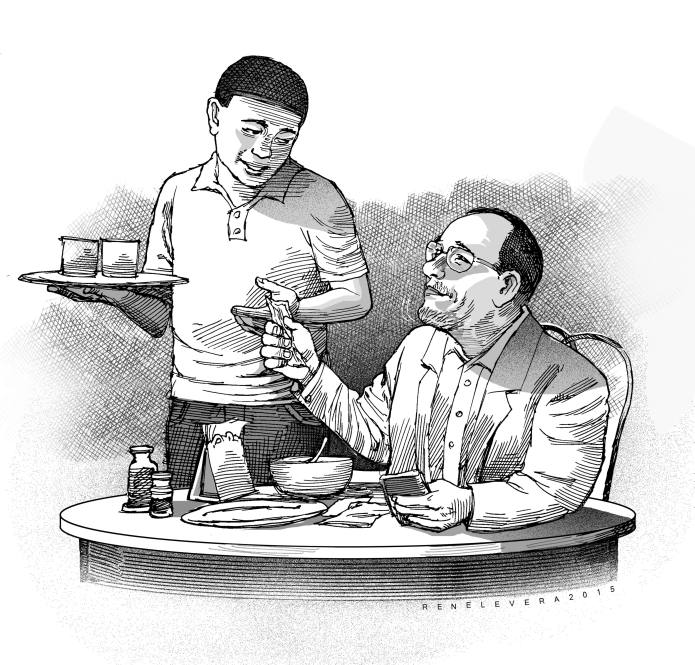One table remained unoccupied when I went inside the restaurant. But I could see that in a matter of minutes a number of customers would stand up and leave. I could have waited for a while to get a table with a better view of the outside. But, as they say, a bird in the hand is worth two in the bush, and so I took the last available table. Someone came from a room behind me to take my order. He wore a hairnet, and the uniform of the restaurant – yellow shirt, denims. (I imagined an establishment where the waiters had a rose embroidered on their denim overalls – denim of the rose.)
Anyway, I asked for pansit molo and three rolls of pan de sal . He passed on the list to the kitchen through the listless girl behind the counter, and then, because at this time some customers had left (I could see them file into a white car parked outside), he fell to clearing the clutter they had left on two tables.
I myself fell to musing upon our different roles – that of the waiter and mine. Which of us had more happiness? At first blush, I might seem to have the advantage. I got service from him. I only had to sit and wait for the soup and bread, while he had to worry about getting and setting the food before me on time, and keeping his eye on my every need. I had to pay for the service, of course.
And yet it made me think. Aristotle affirmed that happiness, or the Good, consisted in activity – in doing, rather than in being – in the active exercise of the soul’s faculties “in conformity with excellence or virtue.” The line we often quote – “They also serve who only stand and wait” – may not always hold true (but then the poet was referring to himself, an aging blind man, who needed to accept his condition with joy).
A judge who had retired lamented that all he did was eat and sleep. He let out the desire to go back to his work. Well, I knew how he felt. He missed the fulfillment that comes with forgetting oneself in activity – in which frequently we find it difficult, as it were, to know the dancer from the dance.
God is activity. Someone wrote that if God is love, there must be within the very nature of God the interaction between the lover, the beloved and the love that they share – a triune quality. Thomas Aquinas used as image for the Blessed Trinity that of speech, which entails a speaker (the Father), the word spoken (the Son) and the breath that results from the utterance (the Holy Spirit).
Each of the three exists in relation to the other. As the writer put it, all three “act in a play of co-equal love.”
He remarked that unless we join in the flow, get into the rhythm of the divine activity, we will experience spiritual pain and desolation. We need to pattern our lives after the Trinity. One cannot just live for oneself. One must find in one’s relationship to, and service of others, the activity that most closely resembles the activity within God Himself. In other words, layers all of one onion, we have meaning only in relation to each other, which alone gives being to the onion, which has no reality apart from its layers.
We find a description of the activity of God in the Gospel of John, in which Jesus tells the apostles, “All that belongs to the Father is mine. That is why I said the Spirit will take from what is mine and make it known to you.” The Father gives everything to the Son, which the Spirit gives to us. This, in his letter to the Corinthians, Paul puts in reverse – “All are yours, and you are Christ’s and Christ is God’s.”
Oh, before I forget, I must say that I liked the soup and the rolls, and paid the service charge.
Disclaimer: The comments uploaded on this site do not necessarily represent or reflect the views of management and owner of Cebudailynews. We reserve the right to exclude comments that we deem to be inconsistent with our editorial standards.

